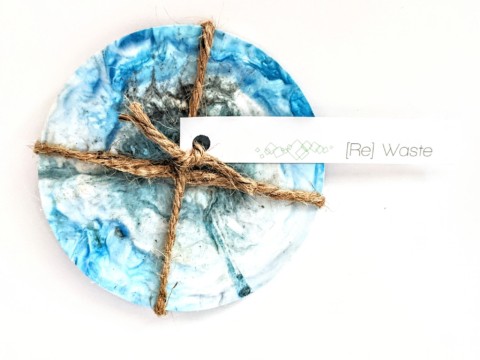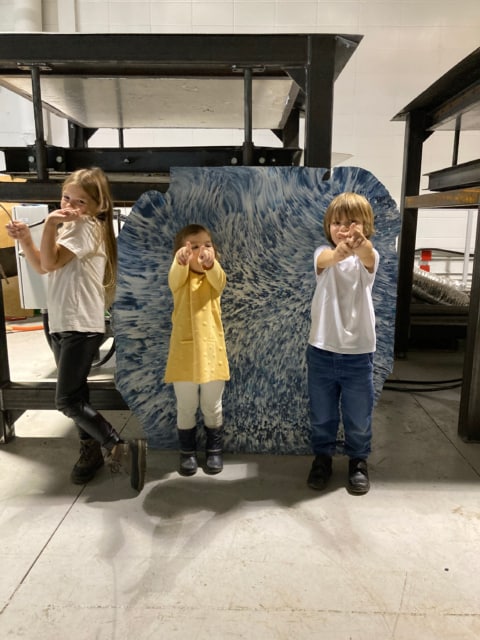*Disclaimer: The following content was released using our former organization name Innovate Edmonton and/or program division Startup Edmonton, prior to the transition to our new brand and name, Edmonton Unlimited.
Innovation: Re-inventing the collection, processing, and manufacturing of plastic waste | Global Challenge: Climate Emergency
The pandemic has changed our lives in many ways, and for Corey Saban, CEO and Founder of [Re]Waste, it sparked an idea: to create an innovative plastic-handling solution that empowers businesses to close the loop on plastic pollution.
Since 2020, [Re]Waste has worked various projects, including partnering with the City of Beaumont, Goodwill Industries of Alberta, Nova Cannabis and more.
Corey contributes his success to fostering the right relationships and learning from past mistakes, as he continues to work towards solving plastic pollution from coast-to-coast, all starting right here in Edmonton.
What inspired [Re]Waste?
I was laid off right at the start of COVID and was able to spend more time at home, so I began researching plastics just as I was exiting the construction industry. I started looking at the plastic waste that we were producing as a family, and I thought to myself “wow there’s a lot of plastic here”. I slowly began exploring the possibility of creating some type of product from the plastic waste.
I started making dense tiles in my garage, and it took 17 grocery bags to make just a tile. Once I started to develop that more consistently, I purchased small scale plastic equipment. I was then able to create a little bit of a product to start selling to see if there’s any market for it.
How is [Re]Waste innovating?
We help businesses divert their plastic from landfills by transforming it into 100% recycled plastic products. The three main parts we operate in are plastic collection, processing, and manufacturing.
We set up collection programs with businesses where they can ship their plastic to us. There are seven types of plastic, so we process the plastic by sorting it by type. Once that is done, we shred the plastic and wash it so that we’re left with clean plastic flakes. The plastic flakes are used to manufacture 4’x4’ plastic sheets, or we do rapid prototyping for custom projects.
What have you enjoyed most about starting your own business?
I really enjoy learning new things and developing relationships. In construction, I was going to networking events and growing my network, but when I moved into plastics, it was a completely different industry for me. There were no familiar faces and nobody knew who I was. I worked on getting out there to talk to people and finding common ground. For me, it’s not a one-sided thing like “Hey, I just need this from you”, it’s more of a “Hey, this is what I’m doing, maybe there’s an opportunity to collaborate or work together”.
I also love connecting ideas and people. With [Re]Waste, it was all about connecting the right pieces to each other.
What lessons have you learned from being an entrepreneur?
Previously, I had an infill home building business that was a failed venture, and I learned a lot of lessons from that experience. You always need to learn from the mistakes, so I worked hard to position [Re]Waste based on some of those lessons learned.
I realized that I can’t do everything, and I need help, so I focused on building a really strong team at [Re]Waste. I know what I’m good at, and I know what I’m not good at. When I started looking at hiring for the company, I was trying to look at my internal circle of connections, and one of my mentors brought up why I wasn’t putting any job postings on any job search sites. At that point, I had a shift in mentality that there might be people out there that do want to work at [Re]Waste.
I also learned the importance of focusing on the legal side of the business. It’s important to get yourself set up with contracts and ensuring you’re protecting the business to the best of your ability. It’s definitely not cheap to go that route, but it’s better to set up that type of structure so that if something does happen, you’re not scrambling at the end of the day.
Tell us about the partnerships that you’ve landed with [Re]Waste.
One of the first two pilot projects we secured was with the City of Beaumont, and the second one was with a coffee shop, which launched a day later. For me, securing those contracts validated what we were doing. At the time, it was me in my garage with an idea. [Re]Waste was just a concept, so to have residents in a municipality believe that something needed to change provided a boost to the business and credibility.
The next step after the pilot projects was to navigate and build on those relationships. With Goodwill, after the initial introduction, we were able to do a pilot project on the product side of things by supplying them with the products that we were creating. This showed us that there are businesses out there that are interested in sustainable initiatives, that want to do better with their waste.
The next big contracts we got were with Nova Cannabis and Value Buds, and that allowed us to grow the business and hire resources. Nova Cannabis was instrumental in getting us out of province and into Ontario. We were still in the garage, but I realized early on that I didn’t want to turn away the opportunity to work with these big businesses just because we’re a startup.
We defined the opportunity to create closed loops for businesses. They have plastic waste which we can use to create a product and reintroduce it as a useful functional product to their business.

What are some dream partners would you like to work with?
There are a couple cool conversations we’ve had, one being with Starbucks. Starbucks is opening on average of 1-2 new shops every single day and that involves tenant improvements in the buildings the shops are located in. A dream project would be creating a product made entirely of recycled plastic that can be used to make countertops, backsplash, tiles, feature walls, shelving, and much more. Everything that you would see in the Starbucks store would be made from recycled plastic.
We’ve also been having interesting conversations with a company out of BC called Nexii Building Solutions. They are a sustainable builder and Canada’s fastest unicorn company. We’ve had early talks with them on how we can utilize recycled plastics and make them a net zero company.
Every contract that we’ve had is a dream contract, because each opportunity allows us to provide a creative element to how we can repurpose plastic waste and make a difference.
Why do you think sustainability is so important today?
I don’t have a waste or sustainability background, but in the last two years, I’ve been able to do a lot of research and see the effects of plastic waste. I think sustainability is so important because of climate change and the impacts that we’re seeing of not handling waste properly. Providing the right way to handle this waste is going to lead to a positive global impact because every city and every country around the world has a plastic problem.
What is one thing we can do as individuals to be more mindful of our waste?
To cut down on waste, especially plastic waste, something that you can do is look at bulk food retailers, such as Bulk Barn, where you can bring your own containers to fill up on products. Try to find options out there that are sustainable rather than opting for purchasing something because it’s readily available or more convenient. My wife and I have three young kids and we try to do some of these things, but with having jobs and managing everything, it was extremely challenging. So, then we thought, it’s not that plastics are bad, it just needs to be handled better.
Plastic is the most economical way to ship compared to something like paper or cardboard that can lead to deforestation. Right now, the existing infrastructure just isn’t working. It’s going to take the collective voice to say we need to change, for this crisis to improve. There are startups like [Re]Waste and others that have some neat innovations trying to solve these problems, but the next step is solving it on a mass scale.
How did you initially come across Startup Edmonton?
When [Re]Waste was still an idea, and I didn’t have much going on due to the pandemic, I saw an Instagram ad promoting the Business Model 101 course. I thought to myself “why not sign up for it.”
So I did, and after completing that and the Lean Canvas course, I went through all the programming at Startup Edmonton including Preflight 1, 2, 3 and Propel.
I give so much credit to Startup Edmonton, because whether you have failed businesses in the past or whether this is your first time, they are really going to validate that what you’re doing is right. The facilitators do a really good job at making it a safe environment to be vulnerable, it takes a certain ability to be able to create that safe space.
I’ve also worked with the Startup Edmonton staff outside of these programs, and they have checked-in with me and provided me with words of encouragement, and perspective on things. I tell everyone about Startup Edmonton and my journey there, it has been a lifesaver.
What is in store for [Re]Waste in 2022? What are you most looking forward to?
We’re looking at launching programs throughout Canada, so we’re going to be working with larger organizations that have locations from coast to coast. I think on the product development side, we are going to see a big shift in companies that want to switch from virgin plastic products to recycled plastic products. We had one customer that was working with wood products and virgin plastic, and we were able to introduce recycled products to replace that which was amazing.
[Re]Waste started out in my garage and to see where we are now and the projects we have coming up, I would have to thank my family for that, this is all because of them. They are the drive behind what I do, and the biggest supporters I have. I’m thankful for our partners, businesses and people within those organizations that have given [Re]Waste an opportunity to succeed. I’m excited about what the future holds for [Re]Waste and the recycled plastics industry.
